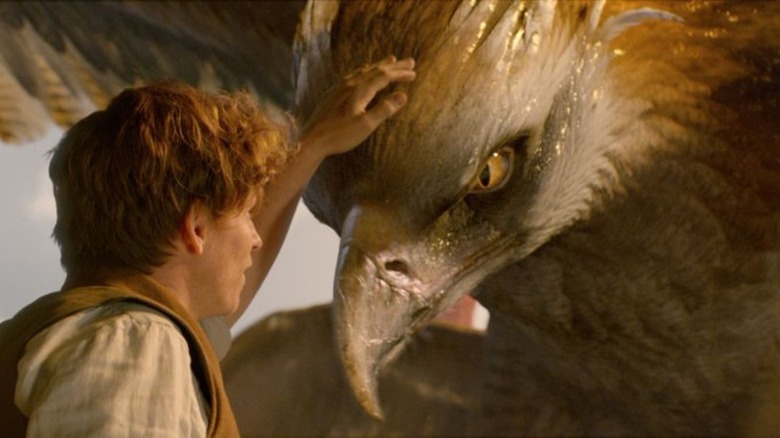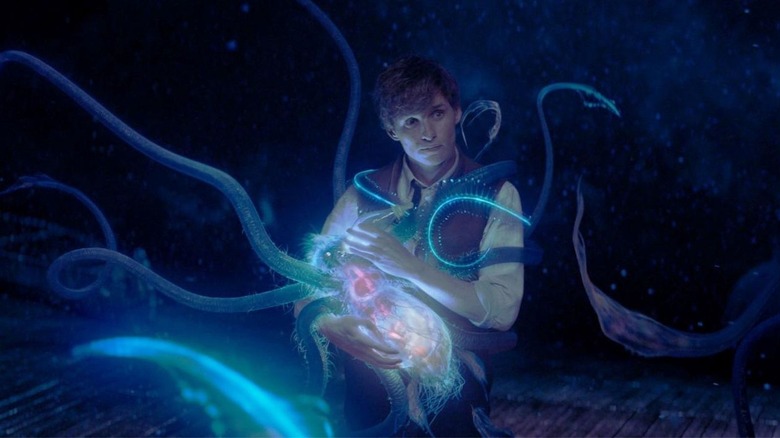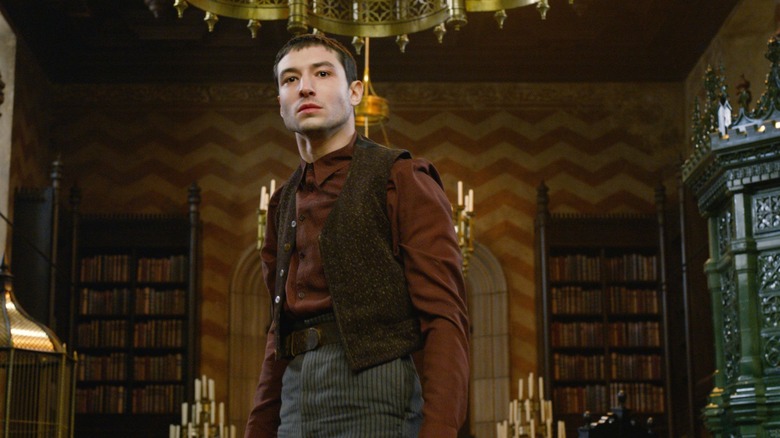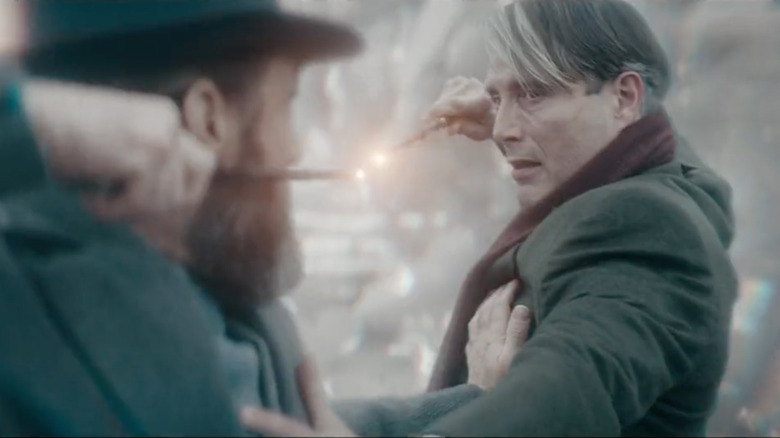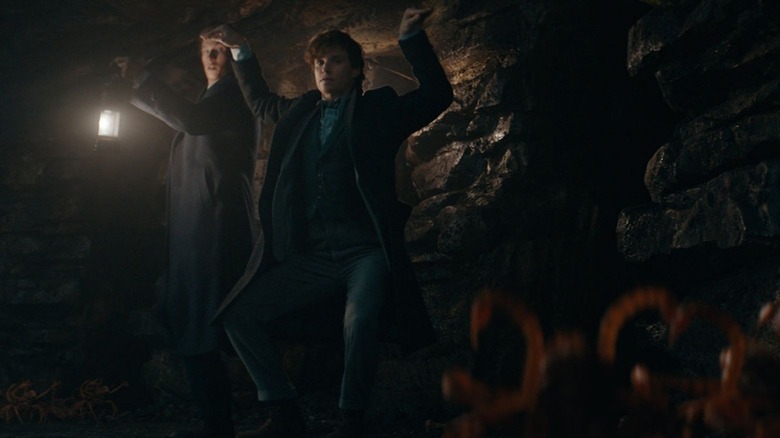The Fantastic Beasts Franchise Should Have Had Faith In Its Fantastic Beasts
Do you know what the one most inconsistent thing in the "Fantastic Beasts" franchise is? The number of actors playing Grindelwald? No. Tina's screen time? Yes, but also no. It is the "Fantastic Beasts" logo declining in size, as if a constant reminder of Warner Bros.' wavering faith in the very thing that made its latest "Harry Potter" property fantastic: its beasts.
When the studio announced a five-part "Harry Potter" spinoff prequel series and declared it was based on a 2001 Hogwarts guide book called "Fantastic Beasts and Where to Find Them," the upcoming franchise seemed to promise a closer glimpse into the wizarding world's unfamiliar magical creatures. We had already seen basilisks, acromantulas, hippogriffs, cornish pixies, and dragons — it was time to learn about a new generation of beasts. Unfortunately, "Fantastic Beasts" quickly dove into fan service (and it's not even for the fans!) and introduced characters so they would ultimately be tied to the legacy of "Harry Potter," completely derailing the franchise from what it was meant to be.
The movie's strongest aspect ... is its beasts
The "Fantastic Beasts" franchise is so obsessed with retconning everything its predecessor ever stood for — the addition of an unfulfilled gay romance for the sake of representation included — that it forgets where its strength lies: in its fantastic beasts.
2016's "Fantastic Beasts and Where to Find Them" entirely relies on Newt's relationship with the magical creatures he has hidden away. The magizoologist (or magical Steve Irwin, as someone once said) conceals a TARDIS-style menagerie in his suitcase (it's, of course, bigger on the inside with the help of an undetectable extension charm), where there's a vast, expanded world where many magical creatures live in their natural habitats. The species include Occamies, Bowtruckles, Nifflers, Swooping Evil, and a Thunderbird, too — beasts we've never seen in the wizarding world. In one scene, when an Erumpent escapes Newt's case and makes its way to the Central Park Zoo, the wizard performs a rhino mating dance to entice the creature and pull him back into the case. He stoops low, hunches, avoid eye contact, thumps his foot, and proceeds to make bizarre noises. It's both hilarious and new — and one of the franchise's highest points before the wizarding world's version of Hitler takes away the spotlight.
Grindelwald is only revealed in the film's ending moments, and even then, the presence of Dumbledore's sworn enemy and a wizard we've heard of in the "Harry Potter" universe doesn't take away from the excitement of the movie being a Newt Scamander show. Newt is an inherently unconventional hero. The character exudes hesitance; he's nervous, nothing like the brave Harry Potter of the past or the formidable young Dumbledore of the future. Still, Newt holds a charm that is so unassuming; you can't help but imagine his story to be a fitting addition to the "Harry Potter" universe.
'Fantastic Beasts' is clinging to its past
"Harry Potter" is one of the most prominent media properties in the world. This is a book series with an eight-part film adaptation, multiple shows on Broadway, three amusement parks, and more. It's a multibillion-dollar brand that was made by a female author's fairy tale success, celebrated child actors, and the idea of a boarding school with witches and wizards that posed as the perfect escapist fantasy. Those were simpler times that any fan can only yearn to return to. The "Fantastic Beasts" franchise has since been a victim of its creator's recent reputation as a transphobe, its problematic star cast, and its indispensable urge to be a Trojan horse for legacy character associations.
Let's talk about the "Star Wars" sequel trilogy, for instance. It introduced Rey Skywalker (Daisy Ridley) and Kylo Ren (Adam Driver) — a new hero and a new villain to lead a modern generation of "Star Wars" fans. Soon, their storyline began desperately clinging to the legacy left behind by the characters of Han Solo (Harrison Ford), Leia Organa (Carrie Fisher), and also Palpatine (Ian McDiarmid), the franchise's original big bad. Characters like Poe Dameron (Oscar Isaac), Finn (John Boyega), and Rose Tico (Kelly Marie Tran) were left on the sidelines, their character arcs overlooked (it still feels ridiculous to me how one gets Oscar Isaac on board and then forgets they did). Kylo Ren had the potential of being a terrific villain, so bringing back Palpatine and then making Rey his granddaughter is the poorest, most unforgivable mistake the sequel trilogy could have ever made. The new "Fantastic Beasts" movie repeats the same error.
Few secrets, more retcon
"Fantastic Beasts: The Secrets of Dumbledore" had few secrets and tons of retconning. Like the "Star Wars" sequel trilogy, "The Secrets of Dumbledore" traverses a similar path. The elephant in the room: the lack of screen time given to Tina Goldstein (Katherine Waterston, an enthusiastic J.K. Rowling skeptic), the franchise's second lead up until the sequel, is defended by a job promotion. Tina is very busy, Newt declares, which is still not reason enough for the character to make a cameo in two scenes.
"The Secrets of Dumbledore" pretends like the film has a lot of Dumbledore and Grindelwald lore to comb through. But it doesn't. They're just ex-high school boyfriends who made a pact to never go against each other — and to die if they do — and then broke up and arranged to make it everyone's problem. Then they had to figure out what to do with Ezra Miller's tragic Obscurial Credence (who appears to have rolled out of his bed and showed up to the sets), and someone had a terrible idea: "Oh, he could be Aberforth's long lost son!" It's blatantly lazy storytelling that doesn't have a spirit of its own. The "Fantastic Beasts" franchise is at war with what it is and what it aspires to be. Its shifting focus from the awkward Newt to the confident Dumbledore, from awe-inspiring creatures to bizarre animal sacrifices and voter fraud, from what could be a truly magical adventure to a desperate attempt to reflect real-world atrocities, is an insincere endeavor that derails everything that is canon to please itself. And it makes very little sense.
'I'm not going home, not really'
"The Secrets of Dumbledore" takes us back to Hogwarts, to the Great Hall and inspired young wizards, to the Room of Requirement and the familiar nostalgia of John Williams' score. It features breathtaking, goosebump-inducing montages of a world we know too well. But these glimpses act as sneak-peeks to simpler times. They don't change the fact that the "Fantastic Beasts" franchise wasn't built for us "Harry Potter" fans to feel like they were going back home. I don't think Warner Bros. even realizes how it reduces a magical moviegoing experience to something so uninspiring. Or maybe it does, and doesn't care enough to do anything about it.
Think of this: If a movie features an epic duel between Dumbledore and Grindelwald that sees them romantically clutching each other's chests, but the most promising scene in the film ends up being one that follows Newt and his brother performing a silly, crablike dance to fool a group of crustaceans, and Warner Bros. fails to see the problem? Maybe it is a good time for them to pull the plug on the franchise's future.
